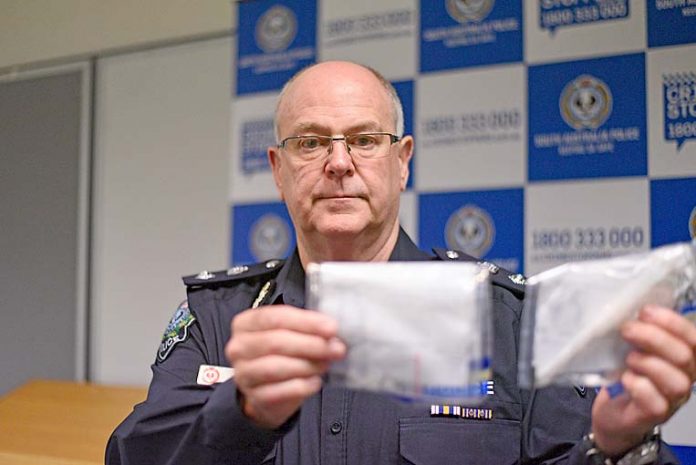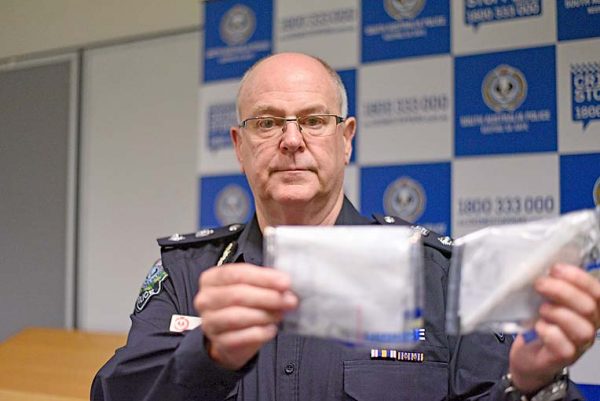

ICE use in Mount Gambier was the hot topic at this week’s Mount Gambier Chamber of Commerce breakfast meeting.
Limestone Coast Police officer in charge Superintendent Grant Moyle and Magistrate Teresa Anderson discussed the issue that has been the cause of many problems throughout the city.
New data shows Mount Gambier is not the crystal methamphetamine capital of the state, but authorities warn it is still the city’s “drug of choice”.
The issue was prompted by a Mount Gambier property manager who revealed rental properties were “sometimes” being used as methamphetamine laboratories.
This comes as police arrested and charged a man for ice trafficking in Mount Gambier on Tuesday.
In addition, a major trial of accused Limestone Coast drug traffickers – who were arrested during police Operation Addenine in 2016 – started in Adelaide yesterday.
During this operation 16 people were charged with a string of drug trafficking offences, which were connected to one of the largest drug related busts in the region.
The trial is considered so big the same Adelaide court that hosted the Snowtown murders case will be used due to the large number of defendants and solicitors.
Limestone Coast Police officer in charge Superintendent Grant Moyle said police continued to target drug traffickers and dispelled claims Mount Gambier was the epicentre of ice use.
“I’m of the view that Mount Gambier has been unfairly labelled as an ice capital and it is unfounded,” Supt Moyle said.
He said wastewater analysis showed from a statewide perspective Mount Gambier had not produced the worst results.
“We are not the worst by a long shot,” the police chief said.
Supt Moyle said the region’s crime statistics were also not showing trends that would indicate a growing ice problem.
“Our crime statistics show we are very low in what we call serious criminal trespass, which includes housebreaks,” he said.
He said these were the types of crimes that people would commit to get money to support their drug habits.
“We have a lot of strategies to keep on top of that, but we are not seeing the robberies and housebreaks you would see in other areas.”
But, he warned ice was cheap and that meant some people may not need to commit offences to pay for their habit.
“I have heard stories of people running a completely normal life, having a good profession and being on this drug, but ultimately they will crash and be in strife,” Supt Moyle explained.
“There are certainly ice users here, but there has always been illicit drug users in this town.
“The drug of choice at the moment happens to be ice because it is cheap and easy to administer.
“If you went back a few years it was heroin.”
He said the problem with ice was that it had a “devastating” affect compared with heroin given ice had major social and health ramifications.
He said illicit drug use was also manifested in mental health issues.
“It is never just about law enforcement – it is about engaging a number of agencies to try and solve the problem,” he said.
Supt Moyle renewed calls for the public to come forward with any information on illicit drug activity in the community.
“We are constantly investigating these people and make apprehensions and achieve seizures, but there is also a lot going on behind the scenes that people do not appreciate sometimes,” he said.
“It is not only what people are seeing coming through the court system.
“Our challenge is if we take one trafficker off the street, another one pops up.”
Mount Gambier resident Magistrate Teresa Anderson – who spoke at yesterday’s breakfast meeting – said she did not believe the ice problem was any greater in the Blue Lake city than other regional centres.
But she said there appeared to be a greater will across the community to tackle ice problem.
“I’m often asked if ice is a bigger problem in Mount Gambier than anywhere else,” she said.
“I have worked at Murray Bridge, Port Lincoln, Mount Barker, Christies Beach in Adelaide and Kangaroo Island,” she said.
“My answer to that is that I do not think it is, but I think Mount Gambier has a real commitment as a community to do something about the problem.
“In other areas I have worked in it is an equally big problem, but the community does not seem to be as concerned.”
Regarding statistics showing the number of people detected drug driving was “miles higher” than other areas, the magistrate said it not necessary mean greater use.
Magistrate Anderson said these number reflected the effectiveness of the Limestone Coast Police “pulling over” drug drivers.
“It just means the detection is greater.”
Mount Gambier Chamber of Commerce president Lynette Martin OAM said she was pleased to hear the Blue Lake city was no worse than any other place in terms of ice use.
“It is a paramount importance to our wellbeing that we have a safe environment for all and the courts play a role in that.”
“We do have a good police presence and a sound judiciary system.
“Overall I think we are very fortunate to live in the Mount Gambier community.”







